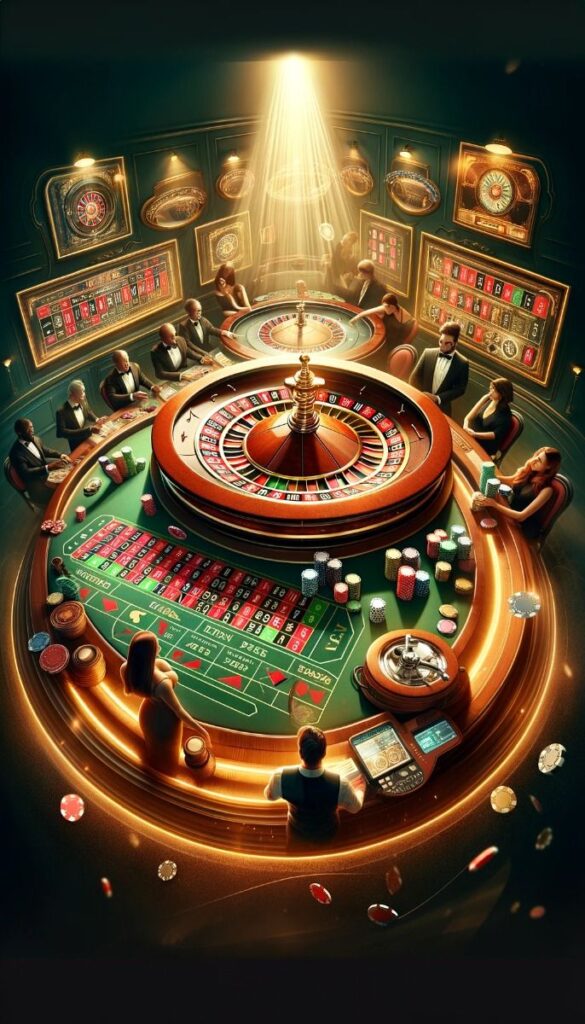Introduction
Roulette, a game of chance with roots tracing back to 18th century France, has become a staple in casinos worldwide. Its allure lies in the simplicity of its rules and the thrill of watching the ball spin and land on a winning number. Whether you’re a novice looking to learn the ropes or an experienced player seeking to refine your strategy, understanding the intricacies of roulette can enhance your gaming experience. This comprehensive guide explores the history, mechanics, strategies, and etiquette of roulette, providing you with a detailed roadmap to mastering the game.
The History of Roulette
Origins of the Game
Roulette, meaning “little wheel” in French, originated in France in the 18th century. The game is attributed to Blaise Pascal, a French mathematician who invented the game while trying to create a perpetual motion machine. The original roulette wheel featured a single zero and a simple layout of numbers, but as the game evolved, it incorporated additional features and variations.
Evolution and Variations
Roulette’s evolution saw the addition of multiple variations and rulesets. The European version, which includes a single zero, became the standard in most casinos. In contrast, American roulette introduced a double zero, increasing the house edge. The game’s popularity spread globally, leading to the development of other regional variations, such as French and Mini Roulette.
Roulette in Modern Casinos
Today, roulette is a prominent feature in both land-based and online casinos. The game has been adapted for digital platforms, offering players a virtual experience that mirrors the excitement of the physical casino environment. Modern roulette wheels and tables are equipped with advanced technology to ensure fairness and accuracy in gameplay.
Understanding the Roulette Wheel and Table
The Roulette Wheel
The roulette wheel is divided into numbered pockets, each representing a different outcome. The standard European wheel has 37 pockets, numbered from 0 to 36. The American wheel includes an additional 00 pocket, making a total of 38 pockets. The layout and design of the wheel ensure that the ball has an equal chance of landing on any given number.
The Roulette Table
The roulette table features a betting layout that corresponds to the numbers on the wheel. The table is divided into various sections, including:
- Inside Bets: Bets placed on specific numbers or small groups of numbers within the grid.
- Outside Bets: Bets placed on broader categories, such as colors or odd/even numbers, located around the grid.
- Announced Bets: Special bets with specific names and rules, often used in French roulette.
The Types of Bets
Roulette offers a wide range of betting options, each with its own odds and payouts. These bets are categorized into inside and outside bets:
- Inside Bets:
- Straight Bet: A bet on a single number. Pays 35 to 1.
- Split Bet: A bet on two adjacent numbers. Pays 17 to 1.
- Street Bet: A bet on three numbers in a row. Pays 11 to 1.
- Corner Bet: A bet on four numbers forming a square. Pays 8 to 1.
- Six Line Bet: A bet on two adjacent rows of three numbers. Pays 5 to 1.
- Outside Bets:
- Red/Black: A bet on the ball landing on a red or black number. Pays 1 to 1.
- Odd/Even: A bet on the ball landing on an odd or even number. Pays 1 to 1.
- High/Low: A bet on the ball landing on numbers 1-18 (low) or 19-36 (high). Pays 1 to 1.
- Dozen Bet: A bet on one of three dozen ranges of numbers. Pays 2 to 1.
- Column Bet: A bet on one of three vertical columns of numbers. Pays 2 to 1.
Strategies for Playing Roulette
The Martingale System
The Martingale system is a popular betting strategy that involves doubling your bet after each loss. The goal is to recover previous losses and make a profit with a single win. While this system can be effective in theory, it requires a substantial bankroll and is subject to table limits, making it risky for long-term play.
The Fibonacci System
The Fibonacci system is based on the famous Fibonacci sequence, where each number is the sum of the two preceding numbers. This strategy involves increasing your bet according to the sequence after a loss and decreasing it after a win. The Fibonacci system offers a more gradual approach compared to the Martingale system and is less likely to result in large losses.
The D’Alembert System
The D’Alembert system is a betting strategy that involves increasing your bet by one unit after a loss and decreasing it by one unit after a win. This system is designed to balance losses and wins over time and is considered a more conservative approach compared to the Martingale system.
The Labouchere System
The Labouchere system, also known as the cancellation system, involves creating a sequence of numbers that represents your desired profit. You place bets based on the sum of the first and last numbers in the sequence. After a win, you cross out the numbers used, and after a loss, you add the lost amount to the end of the sequence. The goal is to complete the sequence and achieve your desired profit.
The James Bond Strategy
The James Bond strategy is a betting system that involves placing a combination of bets to cover more than half of the possible outcomes. This strategy typically involves placing a large bet on high numbers, a smaller bet on the middle range, and a smaller bet on a specific number. The goal is to increase the chances of winning while minimizing potential losses.
The Psychology of Roulette
The Gambler’s Fallacy
The gambler’s fallacy is the belief that past outcomes affect future results in games of chance. In roulette, players might think that a particular number or color is “due” for a win after a series of losses. However, each spin of the wheel is independent, and past results do not influence future outcomes.
The Illusion of Control
The illusion of control is the belief that players can influence the outcome of a game of chance. In roulette, players may believe that their betting patterns or strategies can affect the outcome of the spin. However, the game is governed by randomness, and no strategy can alter the odds of winning.
The Role of Superstition
Superstitions often play a role in roulette, with players believing in lucky numbers, charms, or rituals. While these beliefs can add a personal touch to the game, they do not affect the outcome of the spins. Roulette is a game of chance, and the outcome is determined by the randomness of the wheel and ball.
Roulette Etiquette and Tips
Etiquette at the Roulette Table
Observing proper roulette etiquette ensures a pleasant experience for all players. Key points include:
- Be Respectful: Follow the casino’s rules and respect the dealer and other players.
- Avoid Distractions: Do not distract the dealer or other players during the game.
- Handle Chips Properly: Place your bets in the designated areas and avoid touching chips once the dealer starts spinning the wheel.
- Be Patient: Wait for the dealer to announce the results before placing new bets.
Tips for Enjoying Roulette
- Understand the Rules: Familiarize yourself with the rules and betting options before playing.
- Set a Budget: Establish a budget for your gaming session and stick to it.
- Practice First: Try free online roulette games to practice your skills and strategies before playing with real money.
- Play for Fun: Remember that roulette is a form of entertainment. Enjoy the game and avoid focusing solely on winning.

Exploring Roulette in Las Vegas
Iconic Las Vegas Casinos
Las Vegas is renowned for its luxurious casinos and vibrant roulette scenes. Some notable casinos include:
- The Bellagio: Known for its elegant casino floor and high-stakes roulette tables.
- Caesars Palace: Offers a variety of roulette games, including European and American versions.
- The Venetian: Features a spacious casino with multiple roulette tables and a sophisticated atmosphere.
- MGM Grand: Home to a diverse selection of roulette tables and a lively gaming environment.
Roulette Tournaments
Many Las Vegas casinos host roulette tournaments, where players compete for prizes based on their performance. These tournaments add an exciting competitive element to the game and can be a fun way to test your skills against other players.
Themed Roulette Tables
Some Las Vegas casinos offer themed roulette tables that feature unique designs and additional betting options. These tables provide an immersive and entertaining experience, enhancing the overall enjoyment of the game.
Frequently Asked Questions (FAQs)
What is the difference between European and American roulette?
The primary difference between European and American roulette is the number of zero pockets on the wheel. European roulette has a single zero (0), while American roulette has both a single zero (0) and a double zero (00). This difference increases the house edge in American roulette, making European roulette generally more favorable for players.
How can I improve my chances of winning at roulette?
Roulette is a game of chance, and no strategy can guarantee a win. However, you can improve your chances by choosing European roulette over American roulette, practicing effective bankroll management, and understanding the different betting options and their odds.
What are inside and outside bets in roulette?
Inside bets are placed on specific numbers or small groups of numbers within the betting grid. Examples include straight bets, split bets, and corner bets. Outside bets are placed on broader categories, such as colors or odd/even numbers, and are located around the grid. Outside bets generally have lower payouts but higher chances of winning compared to inside bets.
Are there any strategies for winning at roulette?
Various betting strategies, such as the Martingale, Fibonacci, and D’Alembert systems, can be used to manage your bets and potentially increase your chances of winning. However, it’s important to remember that roulette is a game of chance, and no strategy can alter the inherent odds of the game.
What is the house edge in roulette?
The house edge represents the casino’s advantage over players. In European roulette, the house edge is approximately 2.63%, while in American roulette, it is around 5.26% due to the additional double zero pocket. The house edge affects the long-term profitability of the game for the casino.
How do I choose the right roulette table to play?
When choosing a roulette table, consider factors such as the type of roulette being offered (European or American), the minimum and maximum bet limits, and the overall ambiance of the casino. European roulette is generally more favorable due to its lower house edge.
Can I play roulette online?
Yes, many online casinos offer roulette games, including European, American, and French versions. Online roulette provides a convenient way to enjoy the game from the comfort of your home, with options for live dealer games and virtual roulette.
Conclusion
Roulette remains one of the most captivating and popular casino games, combining simplicity with the thrill of chance. From its historical origins in France to its modern iterations in casinos worldwide, roulette offers a diverse and exciting gaming experience. By understanding the mechanics of the game, exploring various strategies, and practicing proper etiquette, you can enhance your enjoyment and increase your chances of success at the roulette table. Whether you’re spinning the wheel in a luxurious Las Vegas casino or playing online, the allure of roulette continues to captivate and entertain players around the globe. Embrace the excitement, test your luck, and spin into the intriguing world of roulette.
The invention of roulette is commonly attributed to the famous mathematician and philosopher Blaise Pascal. In the 17th century, while Pascal was searching for a perpetual motion machine, he accidentally created the prototype for the roulette wheel. i9bet It was not until later that the game evolved into the popular casino attraction we know today.
